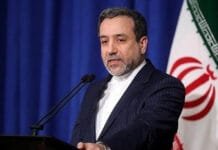
INVC NEWS
Tehran : Iran has escalated diplomatic tensions with Australia following recent calls by Australian opposition leaders to expel the Iranian ambassador. The Iranian Ministry of Foreign Affairs summoned the Australian ambassador to protest the “biased” stance that Australia has taken on the ongoing conflict between Israel and Hamas, marking a significant strain in relations between Tehran and Canberra. This move reflects Iran’s growing frustration over Western nations’ support for Israel amidst the escalating military confrontations in the Middle East.
Diplomatic Row Ignites Over Australian Criticism
The diplomatic standoff between Iran and Australia emerged after Australian Prime Minister Anthony Albanese condemned Iran’s missile strikes on Israel, a reaction to the October 1st attacks that sent shockwaves through the region. In response, Iran summoned the Australian ambassador to Tehran, criticizing Australia’s “unfair” stance on the regional conflicts in Gaza and Lebanon.
In the meeting, Ali Asghar Mohammadi, the Director General of the Department for East Asia and Oceania in the Iranian Foreign Ministry, fiercely criticized Canberra for its silence on Israel’s military actions in Gaza and Lebanon. Mohammadi accused Australia of selective outrage and urged for a more “responsible role” in the ongoing regional disputes. He highlighted that while Australia was quick to denounce Iran’s missile strikes, it has remained largely silent on the Israeli airstrikes in Gaza, which Iran has condemned as acts of genocide.
Iran’s Continued Support for Hamas and Hezbollah
This confrontation comes in the wake of Iran’s unwavering support for Hamas and Hezbollah, organizations that the West largely designates as terrorist groups. The missile strikes by Iran were justified by Tehran as a legitimate response to the killings of key figures such as Ismail Haniyeh, a political leader of Hamas, and General Abbas Nilforushan. Iran’s Supreme Leader, Ayatollah Ali Khamenei, had earlier defended these attacks, calling them “legal and necessary” actions in retaliation to what Iran perceives as unwarranted Israeli aggression.
This continued backing of militant groups in Palestine and Lebanon remains one of the central issues in Iran’s growing rift with Western nations, including Australia. Iran has also been heavily critical of what it perceives as Western double standards in the region, often condemning nations that support Israel while ignoring the plight of Palestinians.
Western Nations Align Against Tehran
Australia is not alone in facing Tehran’s diplomatic ire. The Iranian government has recently summoned diplomats from both Germany and Austria for their criticisms of Tehran’s involvement in the regional conflicts. The recent missile attacks by Iran have sparked widespread condemnation from Western governments, particularly those that maintain close ties with Israel.
In a press release following the diplomatic meeting, the Iranian Foreign Ministry doubled down on its stance, reaffirming Iran’s right to defend itself and its allies against what it describes as Israeli occupation. The Ministry also called on Australia and other Western countries to adopt a more balanced and equitable approach to the Middle Eastern crisis, rather than disproportionately siding with Israel. This statement underscores Iran’s intent to challenge any Western narrative that positions it solely as an aggressor in the ongoing Middle Eastern strife.
Australia’s Internal Debate on Expelling the Iranian Ambassador
The diplomatic fallout has been further exacerbated by the internal political climate in Australia. Following the attacks, Australian opposition leaders called for the expulsion of the Iranian ambassador, citing Tehran’s role in escalating tensions in the region. These calls have intensified the already strained relationship between the two nations. However, as of yet, there has been no official confirmation from the Albanese government on whether such drastic diplomatic measures will be taken.
Prime Minister Anthony Albanese has walked a fine line, condemning Iran’s actions while trying to maintain diplomatic channels open. This measured response may be influenced by the broader regional implications, as Australia navigates its foreign policy amidst growing tensions between Iran and Western nations. Nevertheless, the domestic pressure for a stronger stance against Iran remains significant, particularly as the conflict shows no signs of de-escalation.




















